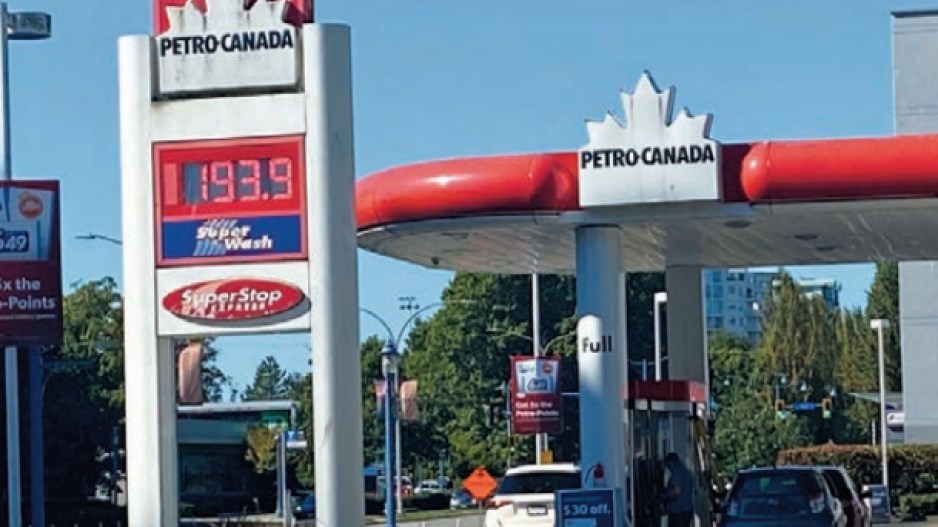This summer, British Columbians paid the highest gasoline prices ever ($2.10 per litre for regular) thanks to an energy crisis, a war in Europe and a fundamental mismatch in supply and demand that pushed global oil prices above US$120 per barrel.
High oil and gasoline prices are key drivers of inflation.
Global prices have tapered off from their summer highs, with West Texas Intermediate (WTI) starting to fall below US$90 per barrel at the end of August. WTI was at US$85 per barrel last week.
Despite falling oil prices, Metro Vancouver gasoline prices have remained stubbornly high compared with the rest of Canada, due in part to refining issues in the Pacific Northwest. Last week, prices for regular gasoline in Metro Vancouver averaged $1.93 per litre, while the national average was $1.52 per litre, according to GasBuddy.
Gasoline prices typically drop a few cents per litre in the fall, as demand falls and refiners switch to cheaper winter blends. That had yet to happen in Metro Vancouver as of last week. In fact, gasoline prices began soaring to new heights Saturday and have just kept soaring, from $2.20 per litre Saturday to $2.33 per litre Sunday. GasWizard predicts prices could hit $2.41 per litre Friday, September 30.
The release of strategic oil reserves in the U.S. may have helped temper runaway oil and gasoline prices in North America somewhat. Also, refinery turnarounds in China temporarily reduced demand for oil.
But a fundamental mismatch will continue for months to come, with supply still not keeping up with demand. The release of strategic oil reserves was only a stopgap measure, said Dan McTeague, president of Canadians for Affordable Energy. Those reserves will need to be replenished, he said.
“This will make a bad situation worse, and therefore October and November will see fuel prices rise steadily and noticeably by December,” he predicts.
Paul Pasco, principal consultant for Kalibrate (formerly the Kent Group), said global oil supply fundamentals would suggest that oil prices probably won’t move much this fall.
“I think we’re going to see that supply tightness stay … and it’s going to keep prices where they are, even if we go into a recession,” he said.
North American natural gas prices also soared, along with oil prices, earlier this year. A bitter winter that drained natural gas storage in Europe in 2021, followed by the war in Ukraine and the sudden loss of Russian gas supplies, has created a full-blown energy crisis in Europe.
As U.S. producers ramped up exports of natural gas to Europe in the form of liquefied natural gas (LNG), North American natural gas prices increased roughly 255 per cent over a two-year period, from US$2.57 per million British thermal units (MMBtu) in mid-September 2020 to US$9.14 per MMBtu in mid-September 2022.
As of July, Western Canadian natural gas was priced at $5.44 per gigajoule – a 72 per cent increase from July 2021, according to the Government of Alberta. Western Canada has plenty of natural gas, which could add to the North American supply and reduce prices, but pipeline bottlenecks mean western gas is backed up and simply can’t get to market.
“We can’t get it to market fast enough,” said Pasco, who expects Canadian natural gas prices to remain high.
As a result of higher natural gas prices, British Columbians who heat their homes with natural gas have had two price hikes from FortisBC in less than a year. On July 1, residential customers in the Lower Mainland and Vancouver Island got an 11 per cent price increase, and FortisBC’s Fort Nelson customers got a 15 per cent increase. That was on top of a nine per cent increase for the Lower Mainland and Vancouver Island in October 2021 and 12 per cent for Fort Nelson.
Fortunately, residential customers in B.C. will not see another price hike for natural gas this fall, says FortisBC. Current rates will remain in effect for the rest of 2022.
As for electricity rates, British Columbians can consider themselves lucky to live in a province with abundant hydro power, where electricity rates are not affected by natural gas prices.
Electricity prices in Europe, which are tied to natural gas prices, have soared so high that several European countries have had to resort to massive cash injections to cap prices or provide rebates to citizens facing energy poverty.
In the U.K., energy bills (heating and electricity) are expected to soar 80 per cent in October, forcing the U.K. government to cap the average household bill at $5,377 annual (about $450 per month).
BC Hydro customers got a small decrease in their electricity rates this year. They dropped 1.4 per cent in April.
(This story has been updated to reflect the most recent hikes in gasoline prices.)




